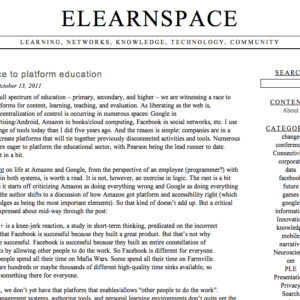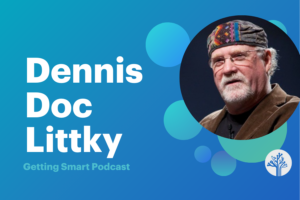The race to platform education
“The race to platform education” was originally published by George Siemens on ELEARNSPACE.
—
 Across the full spectrum of education – primary, secondary, and higher – we are witnessing a race to develop platforms for content, learning, teaching, and evaluation. As liberating as the web is, tremendous centralization of control is occurring in numerous spaces: Google in search/advertising/Android, Amazon in books/cloud computing, Facebook in social networks, etc. I use a smaller range of tools today than I did five years ago. And the reason is simple: companies are in a landrush to create platforms that will tie together previously disconnected activities and tools. Numerous companies are eager to platform the educational sector, with Pearson being the lead runner to date. More on that in a bit.
Across the full spectrum of education – primary, secondary, and higher – we are witnessing a race to develop platforms for content, learning, teaching, and evaluation. As liberating as the web is, tremendous centralization of control is occurring in numerous spaces: Google in search/advertising/Android, Amazon in books/cloud computing, Facebook in social networks, etc. I use a smaller range of tools today than I did five years ago. And the reason is simple: companies are in a landrush to create platforms that will tie together previously disconnected activities and tools. Numerous companies are eager to platform the educational sector, with Pearson being the lead runner to date. More on that in a bit.
This post/rant on life at Amazon and Google, from the perspective of an employee (programmer?) with experiences in both systems, is worth a read. It is not, however, an exercise in logic. The rant is a bit confusing as it starts off criticizing Amazon as doing everything wrong and Google as doing everything right. Then the author shifts to a discussion of how Amazon got platform and accessibility right (which he acknowledges as being the most important elements). So that kind of doesn’t add up. But a critical concept is expressed about mid-way through the post:
Google+ is a knee-jerk reaction, a study in short-term thinking, predicated on the incorrect notion that Facebook is successful because they built a great product. But that’s not why they are successful. Facebook is successful because they built an entire constellation of products by allowing other people to do the work. So Facebook is different for everyone. Some people spend all their time on Mafia Wars. Some spend all their time on Farmville. There are hundreds or maybe thousands of different high-quality time sinks available, so there’s something there for everyone.
In education, we don’t yet have that platform that enables/allows “other people to do the work”. Learning management systems, authoring tools, and personal learning environments don’t quite get the “it’s the platform, stupid” aspect of the internet. Most of the tools we have available today in education allow us to create content within a system. What a platform enables is very different; it enables the extension of a system. Amazon is brilliant at this – they’ve essentially vanquished main components in the book space. They’re basically a monopoly, one that will only increase with the Amazon Fire. For an author, all roads lead to Amazon. Facebook has mastered this in the social network space as well. Facebook is now well past being a social network. Billboards and magazine/newspaper ads for companies list “facebook.com/whatever” instead of an actual open web URL. I guess that’s why Facebook is now bigger than the web was in 2004.
When I was at the Strata conference in February, I was surprised at who wasn’t there in any substantial way – Yahoo, Google, Microsoft (they did present on Azure, but their presence was minimal). Who ruled? Amazon. AWS. Every single session. Because Amazon gets the platform concept – as they did with book selling: entrepreneurs need a platform. They have ideas, but they don’t have huge dollars for technical infrastructure. So, AWS. Plug and play. An entrepreneur doesn’t want to think about the platform. For entrepreneurs in need of big, scalable computing, all roads lead to Amazon.
Similarly, educators don’t want to think about the platform. They want something easy to use – simple, effective, and extensible – so they can get on with teaching and research.
Knewton gets this with their platform, hence their massive $33 million funding round. (note Pearson as a partner).
Pearson and Google appear to be making in-roads in this space with OpenClass:
Today Pearson, the publishing and learning technology group, has joined the software giant Google to launch OpenClass, a free LMS that combines standard course-management tools with advanced social networking and community-building, and an open architecture that allows instructors to import whatever material they want, from e-books to YouTube videos.
I posted on this last year after Blackboard acquired Elluminate and Wimba:
To be effective in the long term, large LMS companies will need to pull more and more of the education experience under their umbrella. Why? Well, technology is getting complex. Very complex. Which means that decisions makers are motivated (partly out of fear of appearing ill-informed, partly out of not wanting to take risks) to adopt approaches that integrate fairly seamlessly across the education spectrum. Why buy an LMS when you can buy the educational process?
I would not be surprised, if in the next several years, educational institutions – especially those who are cash strapped – end up using a content/delivery platform the same way we use Facebook today “Visit us at Pearson.com.” Blackboard’s acquisition binge was about building an integrated infrastructure to offer one-point value for universities (and now, schools with the Edline affiliation). Pearson has been aggressively moving in this direction for over a decade. Startups like Knewton want to be your testing/adaptive content platform (either they get big fast or they will be acquired by Pearson or similar platform-aspirational company). Sure, we’ll still have edupunks and other deviant educators playing at the corners or outer edges of these platforms and systems. Whoever has the platform sets the rules and controls the game. Diversity will be pushed to the margins and Ellul’s fears will be realized in education as they have been realized in much of society.







Shravan
Yes the race is on! Many have already launched some solutions that either half cooked or knocked down platforms. A complete and comprehensive one is still awaited. Google Pearson's offering too is a typical Google Apps that anyways requires user to be a Google user and subscriber to Apps. BB may come up with a revised version but looks like may not be out in near future. Moodle'd solutions seem to be the rockstars still in this space, but with their own limitations. Well, a good space does exist here. Interesting and innovative features would be the key. Many are trying (also tried out), like we are doing our bit (obviously under wraps for now). But certainly a platform that blends LMS, social, collaboration, cloud..... is awaited!
Hunter
iTunesU. Best thing ever. EVER.